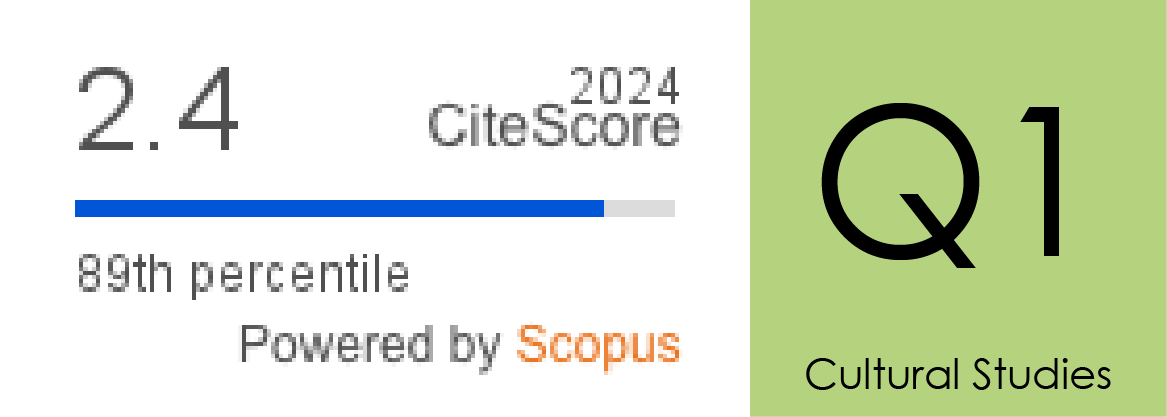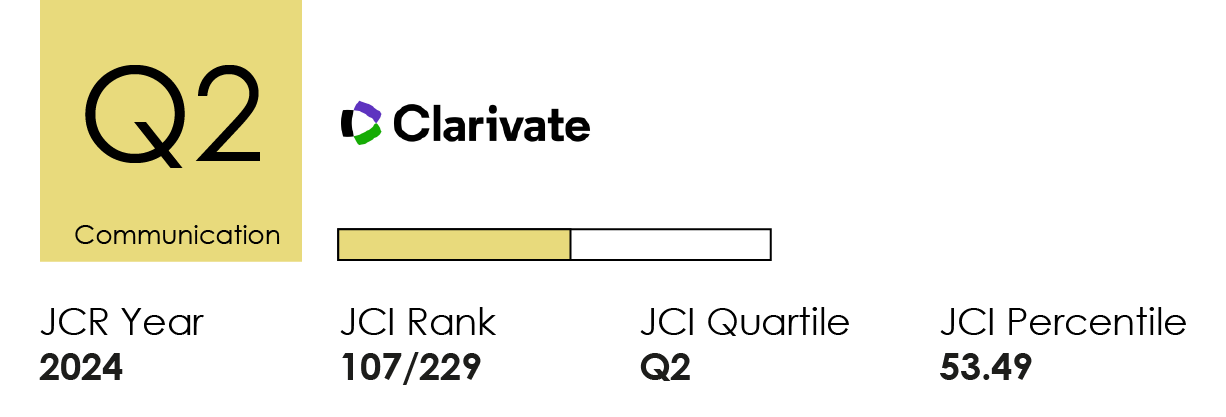Continuidades de la agenda neoliberal en la agenda de desarrollo sostenible de la sociedad de la información: prevalencia del sector privado como actor privilegiado
DOI:
https://doi.org/10.14198/MEDCOM.27354Palabras clave:
autopistas de la información, neoliberalismo, globalización, democracia, Infraestructura Global de la InformaciónResumen
La sociedad de la información se fue consolidando a la par del proyecto neoliberal como respuesta a la crisis de acumulación de capital de 1972. Sin embargo, desde Estados Unidos y, más tarde, los organismos multilaterales, se justificó desde la doctrina del libre flujo de información, posicionando al sector privado como sujeto político privilegiado y condenando cualquier tipo de intervención por parte del Estado. Ante las crisis financieras de fines de siglo XX, se comenzó a difundir la agenda del desarrollo sostenible como marco de las relaciones internacionales, añadiendo una “capa humana” que hacía énfasis en desarrollo integral de las personas como requisito para acceder a los beneficios de la globalización. El presente artículo explica, a través del análisis sociológico del discurso y la técnica de marcos conceptuales, cómo la agenda del desarrollo sostenible de la sociedad de la información, defendido desde los organismos multilaterales con fuerte influencia de Estados Unidos, no solo no cuestionó los marcos neoliberales sobre los que se construyó la noción de sociedad de la información sino que los reprodujo como parte medular de su propuesta.
Citas
Alonso, L. E. (1998). La mirada cualitativa en sociología: Una aproximación interpretativa (1ra. Ed.). Editorial Fundamentos.
Andersson, A., y Hatakka, M. (2013). What are we doing?: Theories used in ICT4D research. 12th International conference on social implications of computers in developing countries, Mayo 19-22, 2013, Ocho Rios, Jamaica, 282-300.
Antrobus, P. (2003). Presentation to Working Group on the MDGs & Gender Equality. UNDP Caribbean Regional Millennium Development Goals (MDGs) Conference, Barbados.
Bangemann, M. (1994). Europe and the global information society: Recommendations to the European council. Journal of Government Information, 22(5), 491−492. https://doi.org/10.1016/1352-0237(95)90037-3
Barlow, J. P. (1996). A cyberspace independence declaration. Cyber-Rights List, 8.
Campos-Arenas, A. (2005). Mapas conceptuales, mapas mentales y otras formas de representación del conocimiento. Coop. Editorial Magisterio.
Campos-Ríos, G. y Sánchez-Daza, G. (2014). Los cambios en el mercado laboral de los países subdesarrollados, a inicios del siglo XXI. International Multilingual Journal of Contemporary Research, 2(3), 63−74. https://doi.org/10.15640/imjcr.v2n3a4
Cassidy, J. (2002). Dot.con: The greatest story ever sold (1st Ed.). HarperCollins.
CEO. (2000, abril). Back to business: revolving doors in Brussels. Corporate Europe Observer, 6. https://bit.ly/3Tibuj7
Charkiewicz, E. (2004). Beyond good and evil: notes on global feminist advocacy. Women in Action, 2, 12.
Cogburn, D. L. (2004). Diversity matters, even at a distance: evaluating the impact of computer-mediated communication on civil society participation in the world summit on the Information Society. Information Technologies and International Development, 1(3-4), 15−40. https://doi.org/10.1162/1544752043557404
Cogburn, D. L. (2017). Transnational advocacy networks in the Information Society: partners or pawns? Palgrave Macmillan US. https://doi.org/10.1057/978-1-137-48361-4
Comisión Económica para América Latina. (2000). Declaración de Florianópolis. https://bit.ly/3VvBWs6
Consejo Europeo. (2000). Conclusiones de la presidencia. Consejo Europeo de Lisboa. https://www.europarl.europa.eu/summits/lis1_es.htm
CORDIS. (1995, febrero 13). G7 Ministerial Conference on the Information Society. https://bit.ly/3TiSMYM
CORDIS. (1996a, abril 12). Information Society and Development. https://bit.ly/3TiSO2Q
CORDIS. (1996b, mayo 14). ISAD Round Table calls for active participation of business community in the Global Information Society. https://bit.ly/3VpkCoH
CORDIS. (1999, julio 2). Commissioner Bangemann suspended from official duties. https://bit.ly/49WK0qh
Cortés, C. (2014). La gobernanza de Internet: la trampa de las formas. Centro de Estudios en Libertad de Expresión y Acceso a la Información. https://shre.ink/8dpA
Council on Foreign Relations. (2019, agosto 20). The G7 and the future of multilateralism. Council on foreign relations. https://bit.ly/49VgocW
Darmofal, D. L., Soderholm, D. H., & Brodeur, D. R. (2002). Using concept maps and concept questions to enhance conceptual understanding. 32nd Annual Frontiers in Education, 1, T3A-1-T3A-6. https://doi.org/10.1109/FIE.2002.1157954
della Porta, D., y Diani, M. (2006). Social movements: An introduction (2nd ed). Blackwell Publishing. ISBN: 978-1119167655
Dyson, E., Gilder, G., Keyworth, G., y Toffler, A. (1994). Cyberspace and the american dream: a magna carta for the knowledge age. Progress & Freedom Foundation.
ECOSOC. (2000). Informe del Consejo Económico y Social correspondiente a 2000. https://bit.ly/498hGAe
Fominaya, C. F. (2014). Social movements and globalization: How protests, occupations and uprisings are changing the world. Macmillan International Higher Education.
Franklin, M. (2005). Gender advocacy at the WSIS. Preliminar Observations (pp. 1-58).
G7/G8. (1995, junio 17). Halifax Summit—Communique. https://bit.ly/43DSGzG
G7/G8. (1998, mayo 17). MOFA: the Birmingham Summit: final communique. https://bit.ly/4a1EwdU
G7/G8. (2000). Capítulo de Okinawa sobre la Sociedad Global de la Información. https://bit.ly/43zi4Xm
Global Information Infrastructure Commission. (2021). About GIIC - Global Information Infrastructure Commission. https://bit.ly/49XqDgR
Gurumurthy, A., y Singh, P. (2006). Civil society and feminist engagement at WSIS: Some reflections. Gender in the information society, 15-26.
Harvey, D. (2007). Breve historia del neoliberalismo. Ediciones Akal.
Hilbert, M. (2004). Hacia un plan de acción regional para la Sociedad de la Información en América Latina y el Caribe. https://bit.ly/4a7ZXKc
Kaldor, M. (2003). Global civil society: An answer to war. Polity Press . ISBN: 0-7456-2757-9.
Keck, M. E., y Sikkink, K. (1998). Activists beyond borders: Advocacy networks in international politics. https://bit.ly/3TnjAH6
Lemberg, L. (2019). Barriers Down: How American Power and Free-Flow Policies Shaped Global Media. Columbia University Press. https://www.jstor.org/stable/10.7312/lemb18216
Mansell, R., y Nordenstreng, K. (2006). Great media and communication debates: WSIS and the MacBride Report. Information Technologies and International Development, 3(4), 15−36. https://doi.org/10.1162/itid.2007.3.4.15
Mastrini, G., y de Charras, D. (2005). Twenty years mean nothing. Global Media and Communication, 1(3), 273−288. https://doi.org/10.1177/1742766505058124
Mattelart, A. (2002). Historia de la Sociedad de la Información (G. Multigner, Trad.). Paidós.
Milan, S., y Padovani, C. (2014). Communication rights and media justice between political and discursive opportunities: an historical perspective. In Padovani, C. y Calabrese, A. (Eds.), Communication Rights and Social Justice (pp. 29−54). Palgrave Macmillan UK. https://doi.org/10.1057/9781137378309_3
Negroponte, N. (1995). Being Digital. Alfred A. Knopf, Inc.
Nordenstreng, K. (2011). Free flow doctrine in global media policy. En Mansell, R. y Raboy, M. (Eds.), The handbook of global media and communication policy, (pp. 79−94). Wiley. https://doi.org/10.1002/9781444395433
Novak, J. D., y Cañas, A. J. (2006). La teoría subyacente a los mapas conceptuales y a cómo construirlos. Reporte Técnico IHMC CmapTools 2006-01. Florida Institute for Human and Machine Cognition. https://bit.ly/3VxmQ5x
O’ Siochrú, S. (2004). Will the real WSIS please stand up? The historic encounter of the ‘Information Society’ and the ‘Communication Society’. Gazette (Leiden, Netherlands), 66(3-4), 203−224. https://doi.org/10.1177/0016549204043606
Organización de Estados Americanos (OEA). (2001a). Connecting the Americas. https://bit.ly/3vmxUb5
Organización de Estados Americanos (OEA). (2001b). Declaración de Quebec. III Cumbre de las Américas. https://bit.ly/3IR6gG8
Organización de las Naciones Unidas (ONU). (2000). Declaración del Milenio. A/RES/55/2. https://bit.ly/4cvYeAg
Organización de las Naciones Unidas. (2002). Financiamiento para el desarrollo sostenible en América Latina y el Caribe. De Monterrey a Johannesburgo. https://bit.ly/4cvYeAg
Organización Mundial del Comercio (OMC). (2010). La OMC y los Objetivos de Desarrollo del Milenio. https://www.wto.org/spanish/thewto_s//coher_s/mdg_s/mdg_s.pdf
Padovani, C. (2016). Gendering the european digital agenda: the challenge of gender mainstreaming twenty years after the Beijing World Conference on Women. Journal of Information Policy, 6, 403−435. https://doi.org/10.5325/jinfopoli.6.2016.0403
Padovani, C., y Santaniello, M. (2018). Digital constitutionalism: fundamental rights and power limitation in the Internet eco-system. International Communication Gazette, 80(4), 295−301. https://doi.org/10.1177/1748048518757114
Parthasarathy, B., y Aoyama, Y. (2016). Beyond ICTs and developmental domains: the historical specificity of ICTD. Proceedings of the Eighth International Conference on Information and Communication Technologies and Development, 1−10. https://doi.org/10.1145/2909609.2909662
Piedras, G. (1998). The Global Information Infrastructure, the Global Information Society, is it a reality? INCOSE International Symposium, 8(1), 557-564. https://doi.org/10.1002/j.2334-5837.1998.tb00081.x
Reagan Shade, L. (2014). Gender and digital policy: from global information infrastructure to internet governance. En C. Carter, L. Steiner, y L. McLaughlin (Eds.), The Routledge companion to media & gender. Taylor & Francis Books.
Rovira Sancho, G. (2015). De las redes activistas a las multitudes conectadas. Movilización social, protesta global y tecnologías de la comunicación. Revista Internacional de Pensamiento Político, 10,157–170. https://shre.ink/8dpH
Ruiz Ruiz, J. (2009). Análisis sociológico del discurso: métodos y lógicas. Forum Qualitative Social Research, 10(2). https://bit.ly/3Vmr5B0
Silberstein-Loeb, J. (2014). The international distribution of news: the Associated Press, Press Association, and Reuters, 1848–1947. Cambridge University Press.
Sparks, C. (2013). What is the “Digital Divide” and why is it important? Javnost-The Public, 20(2), 27−46. https://doi.org/10.1080/13183222.2013.11009113
Unión Internacional de Telecomunicaciones (UIT). (1994). Conferencia Mundial del Desarrollo de las Telecomunicaciones, Buenos Aires 1994. UIT. https://bit.ly/3VAz25t
Unión Internacional de Telecomunicaciones (UIT). (1998). Valetta News. https://bit.ly/498QS2A
Unión Internacional de Telecomunicaciones (UIT). (2002). Informe final de la Conferencia Mundial para el Desarrollo de las Telecomunicaciones CMDT-02. https://bit.ly/3vhx9QC
United Nations Research Institute for Social Development. (1998). UNRISD: Events | Information Technologies and Social Development Conference. https://bit.ly/3Vg7YIF
van Dijk, J. (2006). Digital divide research, achievements and shortcomings. Poetics, 34(4-5), 221−235. https://doi.org/10.1016/j.poetic.2006.05.004
Vedel, T. (1996). Information highway policies in the industrialised countries. A comparative analysis (D. Motlow, Trad.). Réseaux. The French Journal of Communication, 4(2), 351−368. https://doi.org/10.3406/reso.1996.3318
Vidal-Folch, X. (1999, octubre 27). Telefónica aplaza la incorporación de Bangemann a la vez que Bruselas le lleva a los tribunales. El País. https://bit.ly/3IDqOC7
Wheeldon, J., y Faubert, J. (2009). Framing experience: concept maps, mind maps, and data collection in qualitative research. International Journal of Qualitative Methods, 8(3), 68−83. https://doi.org/10.1177/160940690900800307
White House. (1993, septiembre 15). The National Information Infrastructure; Agenda for Action. https://bit.ly/43BLfZT
Descargas
Estadísticas
Publicado
Cómo citar
Número
Sección
Licencia
Derechos de autor 2018 María-Inés Binder

Esta obra está bajo una licencia internacional Creative Commons Atribución 4.0.
Los autores y autoras que publican en esta revista están de acuerdo con los siguientes términos:
1 Derechos de autor. Los autores y autoras conservan sus derechos de autor, aunque ceden a la revista de forma no exclusiva los derechos de explotación (reproducción, distribución, comunicación pública y transformación) y garantizan a esta el derecho de primera publicación de su trabajo, el cual estará simultáneamente sujeto a la licencia indicada en punto 2. Los autores pueden establecer otros acuerdos adicionales para la distribución no exclusiva de la versión de la obra publicada en la revista, siempre que exista un reconocimiento de su publicación inicial en esta revista.
© Los autores.
2 Licencia. Los trabajos se publican en la revista sujetos a la licencia de Reconocimiento 4.0 Internacional de Creative Commons (CC BY 4.0); los términos se pueden consultar en https://creativecommons.org/licenses/by/4.0/
Esta licencia permite a terceros compartir (copiar y redistribuir el material en cualquier medio o formato) y adaptar (remezclar, transformar y crear a partir del material para cualquier finalidad, incluso comercial), siempre que se reconozca la autoría y la primera publicación en esta revista (Revista Mediterránea de Comunicación (RMC) / Mediterranean Journal of Communication (MJC), Universidad de Alicante, DOI de la obra), se proporcione un enlace a la licencia y se indique si se han realizado cambios en la obra.
3 Política de autoarchivo. Se recomienda a los autores que difundan sus trabajos a través de Internet para favorecer una circulación y difusión más rápidas y, con ello, un posible aumento en la citación y alcance entre la comunidad científica y académica, en las siguientes condiciones:
No se permite a los autores depositar en un repositorio institucional o temático, página web propia, etc., las versiones preprint (versión antes de ser evaluada) o postprint (versión evaluada y aceptada para su publicación) de sus trabajos antes de su publicación, pero sí el artículo final publicado (versión del editor).














